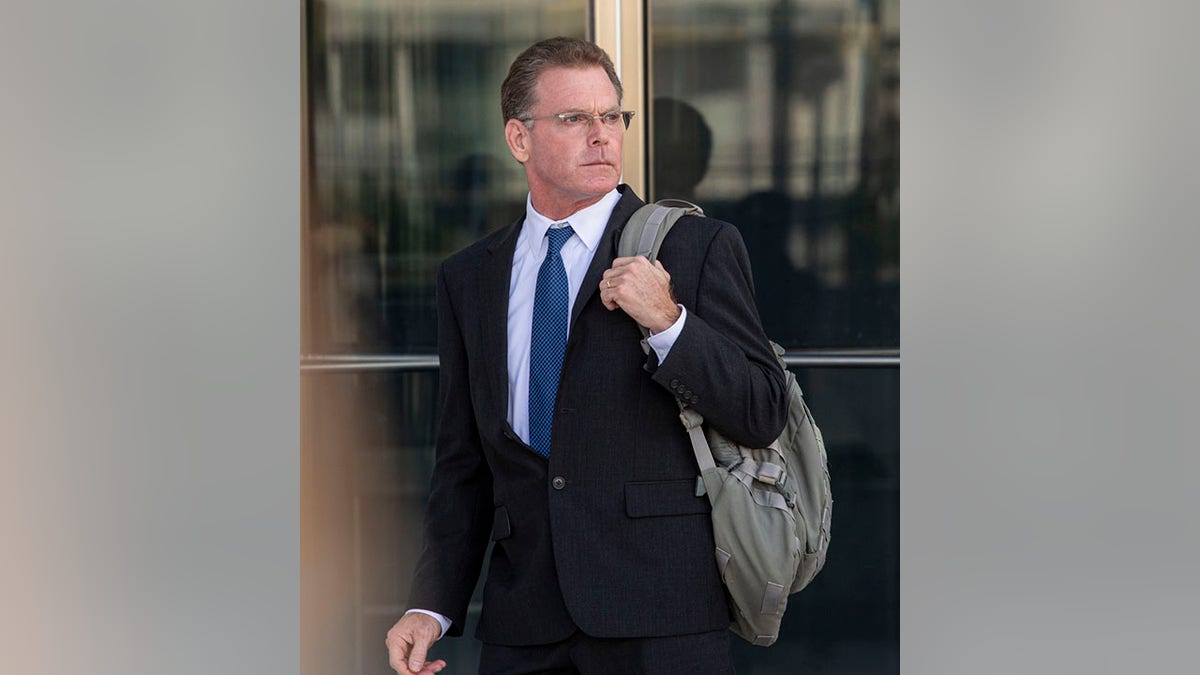Fox News Flash top headlines for June 30
Fox News Flash top headlines are here. Check out what's clicking on Foxnews.com.
An Arizona man who authorities said sold illegal tracer and armor-piercing bullets to the Las Vegas massacre gunman was sentenced to prison Tuesday, according to multiple reports.
Douglas Haig, 57, of Mesa, will spend 13 months in federal prison for manufacturing ammunition without a license,according to Nicholas A. Trutanich, U.S. attorney for the District of Nevada. Haig had pleaded guilty to the federal charge last November.
"This case arose out of the investigation into the October 1, 2017 mass shooting at the Route 91 Harvest music festival in Las Vegas," prosecutors said. "In the hotel room from which the shooter staged his attack, investigators located a box with a shipping label setting forth Haig’s name and address."

Douglas Haig leaves the Lloyd George Federal Courthouse, in Las Vegas, Nov. 19, 2019. (Associated Press)
Still, Haig was not accused of a direct role in the shooting that killed 58 people and injured more than 850 -- described as the deadliest mass shooting in U.S. history. Senior U.S. District Judge James Mahan imposed the sentence but separated Haig from the actions conducted by the gunman, Stephen Paddock.
Paddock killed himself as responding law enforcement officers moved in on him, authorities have said. His precise motivation for the shooting remains a mystery.
“The person who did that, who committed that reprehensible act, we can only hope now that he’s being punished for eternity,” Mahan said, according to the Las Vegas Review-Journal. “He’s escaped punishment on this earth.”
Defense attorney Marc Victor added that Haig had no indication of the plans by the gunman.
“Doug was absolutely devastated when he learned of the tragedy," Victor said.
Haig illegally sold various types of ammunition between July 2016 and October 2017, court documents showed, according to Fox 5 Vegas. A fingerprint examination found his prints on two pieces of armor-piercing ammunition removed from a magazine in the shooter’s hotel room, prosecutors said.
Agents from the FBI and Bureau of Alcohol, Tobacco, Firearms and Explosives (ATF) conducted a series of interviews with Haig, starting on Oct. 2, 2017, where he admitted to meeting the shooter and selling him ammunition. Haig reportedly was not authorized to sell the ammunition and didn't have a federal firearms license, prosecutors said, according to the station.
ARIZONA MAN WHO SOLD AMMUNITION TO LAS VEGAS MASSACRE GUNMAN PLEADS GUILTY
Agents seized "hundreds of pounds of ammunition and ammunition components" on Oct. 24, 2017, after executing a search warrant at Haig's residence. Ammunition or firearms-related equipment was found in nearly every room, including a workshop they said was converted into an ammunition manufacturing operation that Haig was in the process of automating, according to prosecutors.
He reportedly used the workshop to conduct a business named Specialized Military Ammunition where he sold the ammo on the internet and at gun shows around the country. Paddock also purchased the ammunition from Haig through the business, which he closed permanently following the FBI raid, the paper reported.
Victor had previously argued that as the only person to face a criminal charge following the shooting, Haig could not be fairly judged by a jury drawn from the trauma-scarred Las Vegas community. Mahan had ordered Haig, an aerospace engineer, to self-surrender to the Bureau of Prisons (BOP) by Oct. 2, 2020.
CLICK HERE FOR THE FOX NEWS APP
In September, Haig's lawyers are expected to ask the judge to consider the possibility of the coronavirus pandemic leaving him susceptible to serious illness before he is scheduled to start serving his sentence, according to the Las Vegas Review-Journal. Mahan said BOP officials can decide whether Haig may serve some of his prison time at home.
The Associated Press contributed to this story.










































